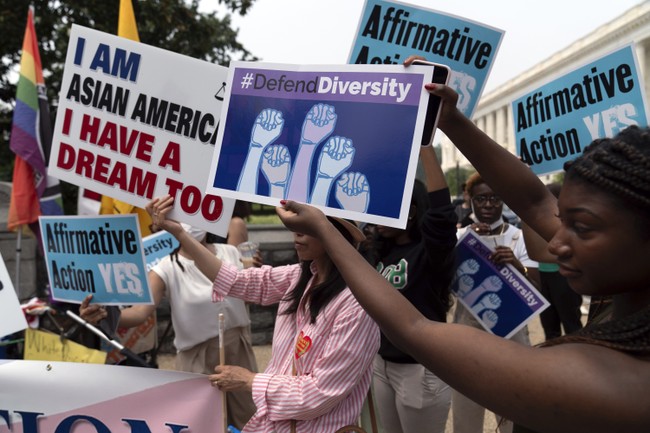The liberal whining cycle started with the usual trite talking points about the Court being illegitimate because it handed down a decision we didn't like that morphed into a racist tirade against Asians and how they can’t think for themselves, serving as pawns of white supremacy. Undoubtedly, it was white liberals who voiced their dissatisfaction the loudest, but they can pack up the circus because their narrative about affirmative action just collapsed. As it turns out, there’s another group of people who are fine with the Supreme Court’s decision: Black Americans (via WaPo):
…the court’s most momentous decision this year — severely restricting the use of affirmative action in college admissions — was arguably quite popular.
Now arrives more data to bolster that point. What the data also suggest is that even Black Americans are unlikely to strongly object.
The data, from an Economist/YouGov poll conducted after the Supreme Court’s decision, shows Americans approving of it more than 2-to-1. That’s a finding in line with surveys conducted before the decision, including from The Washington Post and CBS News, which showed more than 6 in 10 Americans supported the idea of banning the use of race and ethnicity in admissions. Another poll conducted after the decision, for ABC News, showed Americans approved of it by a 20-point margin.
What’s particularly striking about the Economist/YouGov poll is how Black Americans responded. Indeed, more of them actually approved of the decision (more than 4 in 10) than disapproved (fewer than 4 in 10). And more Black Americans “strongly” approved (31 percent) than disapproved (26 percent).
This finding is also in line with previous polling. While polls have long shown Black Americans in favor of affirmative action, The Washington Post-Schar School poll showed nearly half (47 percent) supported banning the use of race and ethnicity in admissions.
[…]
Earlier this year, Pew asked people a battery of questions about affirmative action and efforts to increase diversity. While Black Americans were more likely to view affirmative action as positive than negative, fewer than half (46 percent) saw it as mainly positive. (Twenty percent said it was a negative, while the remainder saw it as mixed or said it made no difference.)
And there was even less perceived upside at the personal level. Asking more broadly about efforts to increase racial and ethnic diversity — rather than specifically about affirmative action — it inquired whether people felt they had been advantaged or disadvantaged by such policies.
Just 20 percent of Black Americans said they felt such policies had put them at an advantage. And strikingly, significantly more — 35 percent — actually said they felt such policies had put them at a disadvantage.


